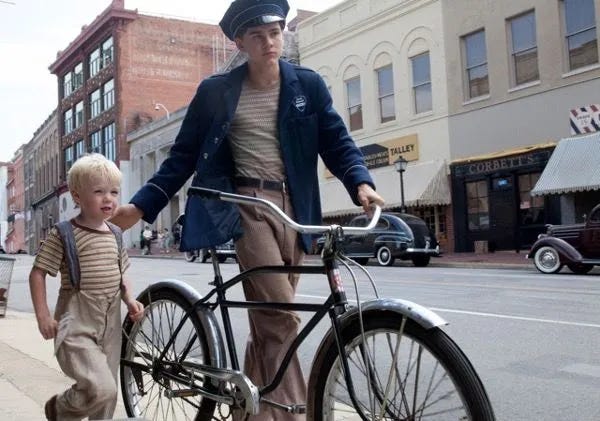In the movie Ithaca, set in World War II California and directed by and starring Meg Ryan (her of the faked orgasm in When Harry Met Sally), with Alex Neustaedter, Jack Quaid and Tom Hanks, one of the first scenes involves Neustaedter, newly engaged at 14 years of age as a telegram messenger boy, delivering a wire to a woman whose soldier son has just been killed in action. Because she is Hispanic and cannot read English, she asks Homer, the delivery boy, to read it to her. He reads it to himself first, and falls over himself in trying to explain its content to the, by now, wailing woman. He leaves, and retches on the way out.
It still troubles him when he returns home that night to his own mother, played by Ryan. At 17’21”, she offers her son solace with these words:
“Everything’s all right, Homer. It’s only that you are becoming aware of the world in which you’ve been a child.”
Alex Neustaedter as Homer with Spencer Howell as his four-year-old brother, Ulysses (who steals all of the scenes that he’s in). It’s no surprise that the film and the book that forms its inspiration are based on the Odyssey.
It’s not the greatest of movies. But I think it’s a great line, if only because I feel the same way myself, now; not at 14 years of age, but in my seventh decade. It’s something you can feel at my age, I can assure you. When you look at your world and your life and you suddenly realise that, now, things have changed. And they haven’t changed in that instant. In fact they never were the way you’d thought. If that sounds melodramatic, it’s because it is quite dramatic, of that there’s no question. The melo- is just something you’ve added.
The change that overcomes Homer is … major, within a week of taking his new job. After the incident with the Hispanic woman, he delivers a telegram to a lady in a fine house who is celebrating her birthday. The guests assume the cable is one of congratulations, but it’s almost word for word the same as the Hispanic woman’s. Homer later tells his ma:
“I didn’t know anything before I got this job. I don’t like the way things are. I just want things to be better. How can any man really get it all straight, so it comes out even and makes sense? Everything’s so sad, and mixed-up, and wrong.”
In the final scenes, Homer discovers the elderly telegraph operator dead at his post. Still in his typewriter is an incoming cable, addressed to Homer’s own mother. He removes it, folds it, places it in his cap, and returns home, where he hands his mother the news that his own brother has been slain in battle. A bizarrely correct way of proceeding.
Much like another Tom Hanks war film, Saving Private Ryan, it’s hard to know whether this movie is anti-war or pro-patriotism. The American flag is not to be seen in a single shot of the movie, and the only death we see is that of the telegraph operator. So, it’s a hard call.
Perhaps it’s neither, but rather a film about growing up. About shattered illusions and lost innocence. About becoming aware of the world in which you’ve been a child. The irony is that growing up is supposed to arm you with the means to make a difference to the world. I’m not sure whether I feel that myself, or indeed that Homer feels that, except that they tell him this: Your brother isn’t really gone, he’s still inside of you. I just try to believe that the best part of a good man stays. It stays for ever.
That’s the message, one that is fundamental to answering the sense of powerlessness that overcomes us when we realise that the world we thought we inhabited was a fata morgana the whole time: to conduct ourselves so that those who love us will carry us with them when we’re gone. And that the best part of us will stay. Stay for ever.
It’s funny how when we try to make sense of a new reality, the sole means that we can fathom for doing so lies in the spiritual. Whether we’re in fact right or wrong, God is always with us. Isn’t He?
Don’t be misled by the close-up of Mr Hanks. He is in the film for about one minute total, and says about five words.
The film was reviewed fairly unfavourably. Sometimes reviewers make demands of a film that it’s not prepared to deliver, instead of sitting back and allowing the film to speak to them.





Thank you Graham. It was difficult growing up during WW2, I was 6 in September 1939, 12 in 1945. I remember we were supposed to be proud of the allies, hateful of the axis, until 1946 when the German and Italian refugees flooded into Canada, then we were supposed to be forgiving and friendly, but not to the Japanese (I never did understand why)
Over the next 80 years I've come to detest war. While I still believe the Allies were justified in defending Europe and the far east in WW2. I see no reason for war elsewhere or since. I've come up with two possible solutions. Have annual month long cruises to the moon for all war loving creatures, send other rockets to the moon filled with armament, ammunition, food and water sufficient for the month and let them fight each other to their heart's content. Or have a team of highly trained assassins in the employ of the United Nations and not subject to the Security Council. Their job would be to immediately assassinate every single war monger on Earth the minute they opened their mouth. Goodbye Putin, Xi, trump slime, Netanyahu, and ilk